As the outside temperature falls, older people need to dress warmly both inside and outside the home. Even while sleeping, everyone should have enough night clothing and blankets to stay warm.
Eating a nutritious diet and staying active also helps the body function properly during cold weather conditions.
Older people should avoid putting themselves in situations that may lead to long periods of exposure to cold weather, such as a home thermostat set too low, spending too much time outdoors, or making a long car trip during extreme winter weather conditions.
If roads are icy or snowy, exercise extreme caution when driving by going slow and limiting outings to only those absolutely necessary. Be sure to have a cell phone or means to call for help if you do go out.
When indoors, the thermostat should never be set below 68 degrees, since slightly cooler indoor temperatures can cause hypothermia in an older person. This is especially important for people with chronic illnesses or low activity levels. If temperatures drop below 20 degrees, it is important to take measures to drip water from faucets to keep pipes from freezing.
When outside, older people should be especially careful about frostbite and its winter relative, hypothermia, as older people are often the most susceptible to these cold weather conditions.
Frostbite is the easiest to recognize. Symptoms include loss of feeling to areas of the body exposed to cold such as cheeks, nose, chin, forehead, ears, hands, and feet. The skin affected will have a white or pale appearance. Medical attention should be sought immediately.
Hypothermia is a more subtle and a very serious problem. Symptoms of hypothermia include slow, slurred speech or incoherence; memory loss or disorientation, drowsiness, repeated stumbling, and exhaustion. Uncontrolled shivering can be a symptom of hyperthermia, but not always with older people.
Diagnosing hypothermia can be as simple as taking one’s temperature with a thermometer. If the person’s temperature is below 96 degrees, immediately seek emergency medical help.
A person’s best allies during cold weather are his or her friends, neighbors, and relatives. Set up a buddy system of friendly calls or checkups with other people in times of cold weather, and ask others to check up on you.
Things to keep on hand at home are extra blankets, shelf-stable food items, and bottled water.
For information about this and helpful services, call your local senior center. In addition, you can call my office at 1-888-895-3306. Visit us on the Internet at www.EgyptianAAA.org.

